News
News
Latest News
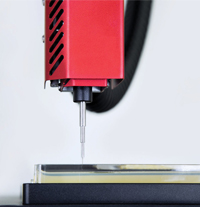
Advanced Robotics Meets Synthetic Biology
February, 2021 / MediCine
Synthetic biology is the marriage between science and engineering to design and build biological parts and cutting-edge devices to help fuel bio-based economies. This motivation to accelerate innovation in synthetic biology between academia and industry resulted in the establishment of the Singapore Consortium for Synthetic Biology (SINERGY), hosted by NUS…
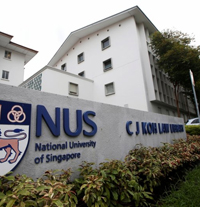
NUS team tests ‘synthetic biology’ techniques to combat genetic disease Type 2 Diabetes
August 2, 2019 / International Business Times
Singapore has declared war against diabetes three years ago when it was emerging as a major health issue with huge economic burden on the nation. Now the researchers from National University of Singapore (NUS) have decided to take the fight further, seeking innovative ways to understand the genetic causes behind the disease and to make use of innovative ‘synthetic biology’ techniques to combat genetic-linked Type 2 diabetes…
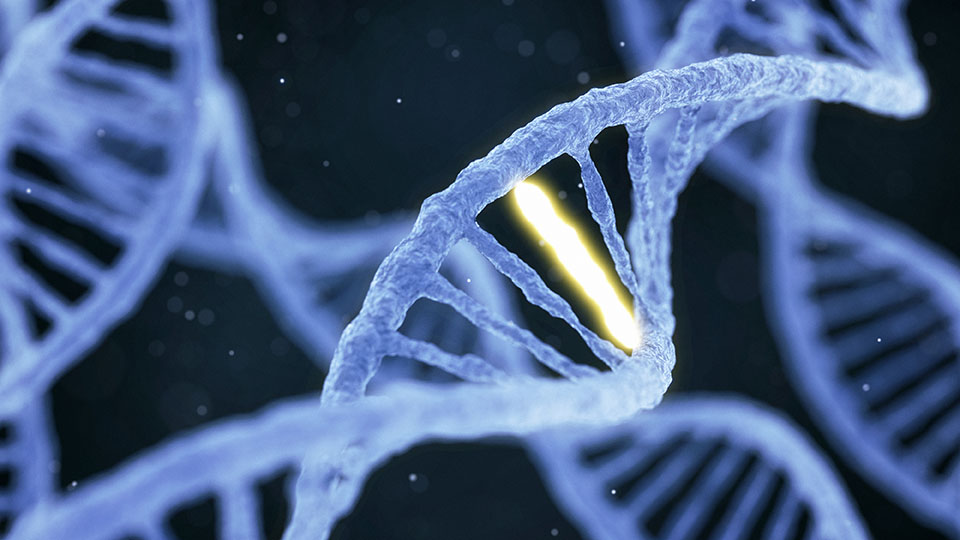
Decoding genetic diseases through synthetic biology
July 31, 2019 / NUS News
In 2016, Singapore declared war on diabetes. Despite this call to action, and the resulting public awareness of the importance of a healthy lifestyle, the disease continues to be a major health issue and economic burden on the nation…

NRF Investigatorship 2019 Awardees
January 15, 2019 / NUS Research News
The NRF Investigatorship was established by the National Research Foundation to enable established researchers to pursue innovative, high-risk research. A/P Matthew Chang is one of the four NUS researchers amongst the recipients of the 2019 National Research Foundation (NRF) Investigatorship….

New research facility to create healthier food products for region
June 19, 2018 / Channel News Asia
A new research laboratory focusing on creating healthier food products for Asian consumers was set up on Tuesday (Jun 19), with the aim of exploring more nutritious alternatives such as plant proteins and cholesterol-friendly cooking oils…
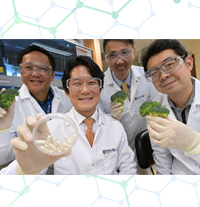
Cocktail of bacteria and broccoli may keep cancer at bay
February 15, 2018 / The Straits Times
A day when taking a probiotic drink and eating vegetables could stave off colon cancer may just be closer. Scientists in Singapore claim to have found a way to turn a harmless cocktail of the common gut bacteria E. coli Nissle and broccoli into a potent anti-cancer mix. The concoction has been proven in the laboratory to kill off 95 per cent of lab-cultured colon cancer cells. Now, trials on actual colon cancer cells from patients in Singapore are on the cards….
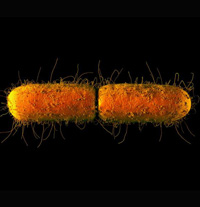
Microbes in the medical bag
January 4, 2018 / Knowable Magazine
In May of 2011, a savage epidemic of foodborne illness broke out in Germany. Health officials quickly identified the culprit as a gut-poisoning strain of the bacterium Escherichia coli, but it took more than a month to trace its source to contaminated bean sprouts grown from fenugreek seeds. By the time the epidemic burned itself out many weeks later, cases had spread to several countries in Europe and North America, close to 4,000 people had been sickened, and 53 had died. Some 850 developed a life-threatening complication called hemolytic uremic syndrome, or HUS, in which Shiga toxin produced by E. coli ravages the kidneys, causing acute kidney failure…

Asia’s Rising Scientists: Matthew Chang
November 24, 2017 / Asian Scientist Magazine
With the advancement of molecular tools in biology, scientists can now tinker with the fundamental building blocks of life to reprogram organisms and direct their behaviors and functions in ways that benefit humankind. This is the domain of synthetic biology, and Associate Professor Matthew Chang has spent most of his research career pushing its frontiers. As the director of the Synthetic Biology for Clinical and Technological Innovation (SynCTI) program at the National University of Singapore (NUS), Chang works at the interface of biology and engineering, stewarding a multidisciplinary team to develop solutions in medicine, manufacturing and sustainability.
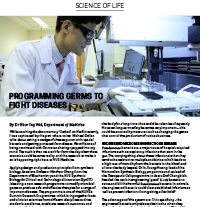
Programming Germs to Fight Diseases
July 27, 2017 / NUS Medicine Newsletter
While watching the documentary “Cooked” on Netflix recently, I was captivated by the part where writer Michael Pollan talks about eating a wedge of cheese grown with special bacteria and getting protected from disease. Wow! Visions of being vaccinated with Parmesan shavings popped into my mind. The truth is that we aren’t far from the day when these scenarios could become reality, and the research to make it so is happening right here at NUS Medicine. Applying design and production principles from synthetic biology, Associate Professor Matthew Chang from the Department of Biochemistry and the NUS SynCTI is leading a new research programme to modify microbial genes to produce safe and effective therapies for a range of important diseases.
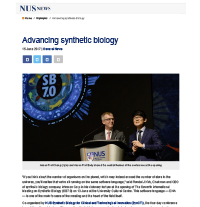
Advancing synthetic biology
June 15, 2017 / NUS News
SB7.0 will provide a unique platform for a global community of synthetic biologists to gather and plan together for collective growth of our science, its beneficial applications, and responsible practices. — Assoc Prof Matthew Chang. This edition of the conference series was focused on three themes — “Revolution 2”, “All People and the Planet”, and “Diversity with Harmony”, which aimed to get participants to discuss the next technical and scientific step in the field and address possible implications on the planet in an inclusive environment of openness and sharing.

From living on earth to living with earth
June 9, 2017 / The Straits Times
NATURE’S NATURAL TECHNOLOGY – Living organisms harness energy, process information and make stuff astonishingly well. Plants, for example, create a wealth of complex chemicals and materials starting from just water, sunlight and the earth’s atmosphere. Life’s “smart technology” has been developing naturally for billions of years, and nature’s examples are now informing and inspiring researchers and entrepreneurs everywhere. Fully mature biological technologies, at their best, promise to remake how the human race interacts with the rest of our planet, enabling us to transition from living on earth to living with earth.
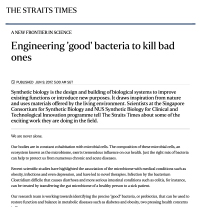
Engineering ‘good’ bacteria to kill bad ones
June 9, 2017 / The Straits Times
We are never alone. Our bodies are in constant cohabitation with microbial cells. The composition of these microbial cells, an ecosystem known as the microbiome, exerts tremendous influence on our health. Just the right mix of bacteria can help to protect us from numerous chronic and acute diseases.Recent scientific studies have highlighted the association of the microbiome with medical conditions such as obesity, infections and even depression, and have led to novel therapies. Infection by the bacterium Clostridium difficile that causes diarrhoea and more serious intestinal conditions such as colitis, for instance, can be treated by transferring the gut microbiome of a healthy person to a sick patient.
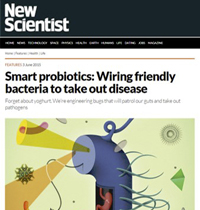
Smart probiotics: Wiring friendly bacteria to take out disease
Jun 3, 2015 / New Scientist
MATTHEW WOOK CHANG has opened an academy for assassins. His trainees are deadly. By rewiring the genes of the common gut bacterium Escherichia coli, Chang has created a killer that can detect, chase down and destroy microbes that make us sick. His primary target is Pseudomonas aeruginosa, a bacterium that seizes any chance to infect people with weak immune systems. It can wreak havoc in hospital wards, in the lungs of those with cystic fibrosis, and in the guts of premature babies. In 2013, Chang put his assassins through their paces in a lab flask. They have since been hanging out in the guts of mice, keeping them safe. “We’re about to wrap up animal studies,” he says. “The survival rate of the mice was significantly increased.” He is now training up assassins for other …
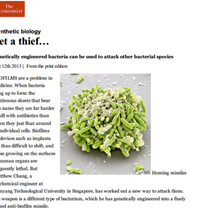
Set a thief…
Genetically engineered bacteria can be used to attack other bacterial species
Oct 12, 2013 / The Economist
BIOFILMS are a problem in medicine. When bacteria gang up to form the continuous sheets that bear this name they are far harder to kill with antibiotics than when they just float around as individual cells. Biofilms on devices such as implants are thus difficult to shift, and those growing on the surfaces of human organs are frequently lethal. But Matthew Chang, a biochemical engineer at Nanyang Technological University in Singapore, has worked out a new way to attack them. His weapon is a different type of bacterium, which he has genetically engineered into a finely honed anti-biofilm missile.
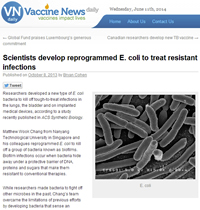
Scientists develop reprogrammed E. coli to treat resistant infections
Oct 8, 2013 / Vaccine News Daily
Researchers developed a new type of E. colibacteria to kill off tough-to-treat infections in the lungs, the bladder and on implanted medical devices, according to a study recently published in ACS Synthetic Biology. Matthew Wook Chang from Nanyang Technological University in Singapore and his colleagues reprogrammed E. coli to kill off a group of bacteria known as biofilms. Biofilm infections occur when bacteria hide away under a protective barrier of DNA, proteins and sugars that make them resistant to conventional therapies.
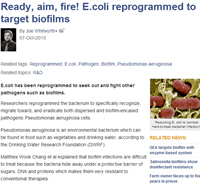
Ready, aim, fire! E.coli reprogrammed to target biofilms
Oct 7, 2013 / Food Quality News
Researchers reprogrammed the bacterium to specifically recognize, migrate toward, and eradicate both dispersed and biofilm-encased pathogenic Pseudomonas aeruginosa cells. Pseudomonas aeruginosa is an environmental bacterium which can be found in food such as vegetables and drinking water, according to the Drinking Water Research Foundation (DWRF). Matthew Wook Chang et al explained that the biofilm infections are difficult to treat because the bacteria hide away under a protective barrier of sugars, DNA and proteins which makes them very resistant to conventional therapies.
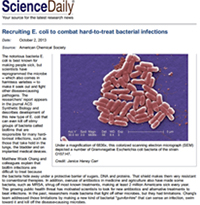
Recruiting E. coli to combat hard-to-treat bacterial infections
Oct 02, 2013 / Science Daily
The notorious bacteria E. coli is best known for making people sick, but scientists have reprogrammed the microbe — which also comes in harmless varieties — to make it seek out and fight other disease-causing pathogens. The researchers’ report appears in the journal ACS Synthetic Biology and describes development of this new type of E. coli that can even kill off slimy groups of bacteria called biofilms that are responsible for many hard-to-treat infections, such as those that take hold in the lungs, the bladder and on implanted medical devices.
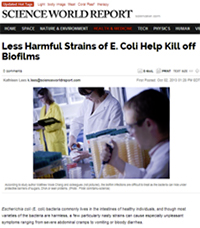
Less Harmful Strains of E. Coli Help Kill off Biofilms
Oct 02, 2013 / Science World Report
Escherichia coli (E. coli) bacteria commonly lives in the intestines of healthy individuals, and though most varieties of the bacteria are harmless, a few particularly nasty strains can cause especially unpleasant symptoms ranging from severe abdominal cramps to vomiting or bloody diarrhea. Yet a recent study looks at less harmful strains of E. coli that can help fight off more deadly bacterial infections. Scientists worked to reprogram the microbe that comes from the strain in order to fight off biofilms that are responsible for many hard-to-treat infections that may actually take root in the lungs, bladder or even implanted medical devices.
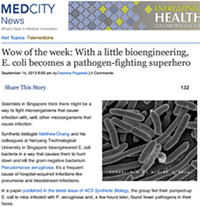
Wow of the week: With a little bioengineering, E. coli becomes a pathogen-fighting superhero
Sep 14, 2013 / MedCity News
Scientists in Singapore think there might be a way to fight microorganisms that cause infection with, well, other microorganisms that cause infection. Synthetic biologist Matthew Chang and his colleagues at Nanyang Technological University in Singapore bioengineered E. coli bacteria in a way that causes them to hunt down and kill the gram negative bacterium Pseudomonas aeruginosa. It’s a frequent cause of hospital-acquired infections like pneumonia and bloodstream infections.
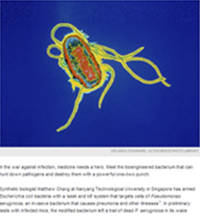
Engineered bacterium hunts down pathogens
E. coli microbe seeks out and destroys invaders without harming helpful bacteria.
Sep 11, 2013 / Nature News
In the war against infection, medicine needs a hero. Meet the bioengineered bacterium that can hunt down pathogens and destroy them with a powerful one–two punch. Synthetic biologist Matthew Chang at Nanyang Technological University in Singapore has armed Escherichia coli bacteria with a ‘seek and kill’ system that targets cells of Pseudomonas aeruginosa, an invasive bacterium that causes pneumonia and other illnesses1. In preliminary tests with infected mice, the modified bacterium left a trail of dead P. aeruginosa in its wake.
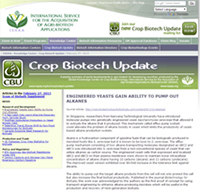
Engineered yeasts gain ability to pump out alkanes
Feb 27, 2013 / Crop Biotech Update
In Singapore, researchers from Nanyang Technological University have introduced molecular pumps into genetically engineered yeast Saccharomyces cerevisiae that allowed it to extrude the alkane that it produced. This mechanism called efflux pump system could alleviate the problem of alkane toxicity in yeast which limits the productivity of yeast-based alkane production system. Akane is a hydrocarbon component of gasoline fuels that can be biologically produced in microbial hosts like S. cerevisiae but it is known to be toxic to S. cerevisiae.
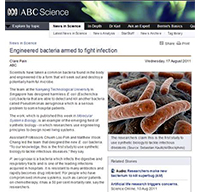
Engineered bacteria armed to fight infection
Aug 17, 2011 / ABC
Scientists have taken a common bacteria found in the body and engineered it to a form that will seek out and destroy a potentially harmful microbe. The team at the Nanyang Technological University in Singapore has designed harmless E. coli (Escherichia coli) bacteria that are able to detect and kill another bacteria called Pseudomonas aeruginosa which is a serious problem to some hospital patients. The work, which is published this week in Molecular Systems Biology, is an example of the emerging field of synthetic biology – in which researchers use engineering principles to design novel living systems.
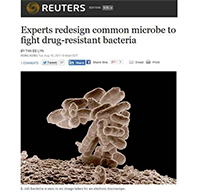
Experts redesign common microbe to fight drug-resistant bacteria
Aug 16, 2011 / Reuters
Researchers in Singapore have re-engineered a harmless strain of bacteria to fight another common, drug-resistant microbe that spreads in hospitals and is deadly to patients with weak immune systems. To fight the Pseudomonas aeruginosa bacterium, the scientists used a strain of the E.coli bacteria that is normally present in the human gut. They inserted into E.coli foreign DNA fragments that empowered it to sense the offending pathogen and quickly produce and release a deadly toxin.
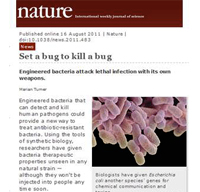
Set a bug to kill a bug
Aug 16, 2011 / Nature News
Engineered bacteria that can detect and kill human pathogens could provide a new way to treat antibiotic-resistant bacteria. Using the tools of synthetic biology, researchers have given bacteria therapeutic properties unseen in any natural strain — although they won’t be injected into people any time soon. “Our study is the first example of how synthetic biology will be useful for fighting bacterial infections,” says biochemical engineer Matthew Chang, an author on the paper, which is published today in Molecular Systems Biology.
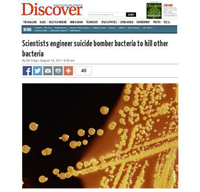
Scientists engineer suicide bomber bacteria to kill other bacteria
Aug 16, 2011 / Discover
In a lab in Singapore, scientists are designing and breeding suicide bombers. If their efforts pan out, they will be applauded rather than jailed, for their targets are neither humans nor buildings. They’re bacteria. Nazanin Saeidi and Choon Kit Wong have found a new way of killing Pseudomonas aeruginosa, an opportunistic species that thrives wherever humans are weak. It commonly infects hospital patients whose immune systems have taken a hit. It targets any tissue it can get a foothold on – lungs, bladders, guts – and it often causes fatal infections. To seek and destroy this threat, Saiedi and Wong have used the common lab bacterium Escherichia coli as a sacrificial pawn.
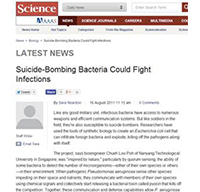
Suicide-Bombing Bacteria Could Fight Infections
Aug 16, 2011 / Science
Like any good military unit, infectious bacteria have access to numerous weapons and efficient communication systems. But like soldiers in the field, they’re also susceptible to suicide bombers. Researchers have used the tools of synthetic biology to create an Escherichia coli cell that can infiltrate foreign bacteria and explode, killing off the pathogens along with itself. The project, says bioengineer Chueh Loo Poh of Nanyang Technological University in Singapore, was “inspired by nature,” particularly by quorum sensing, the ability of some bacteria to detect the number of microorganisms—either of their own species or others—in their environment.
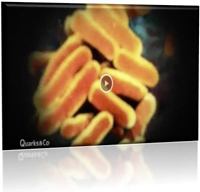
Bacteria against bacteria
West Germany Broadcasting
(Featured by TV documentary “The world of bacteria: We need them and they need us”).
